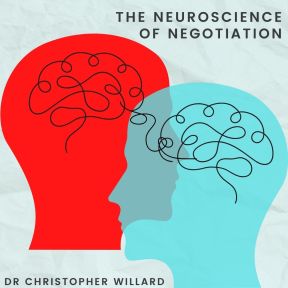NEUROSCIENCE-The Neuroscience of Negotiation. An introduction to leveraging neuroscience to communicate more effectively.

Negotiation happens every day — verbally and nonverbally, in ways large and small. We negotiate an extension on a work deadline, where we go to dinner with our partner, bed times with our kids, and nonverbally negotiate personal space as we walk down the street. Fundamentally, it’s an interaction to reach an agreement that ideally works reasonably well for everyone.

And yet, there is so much more at play than just words and strategies we’ve all learned in seminars, what’s become interesting to me is the way our brains, bodies and nervous systems play a huge role in communication and negotiation, oftentimes below our conscious awareness.
Or the fact that evolutionary psychology tells us that we’ve actually survived as a species because of cooperation, communication, and collaboration. Even as primitive cultures, we were negotiating over who hunts and who gathers, and how we divide the food and labor, so negotiation is wired into us evolutionarily to survive, which we can also find in the greatest apes and the smallest insects.
What’s more, much of the work of the nervous system is unconscious. We’ve all heard that such a small part, maybe only 8% of communication is the words themselves — the rest is tone, body language, volume, and so many other kinds of signals bouncing between brains both conscious and unconscious. Our brains and our nervous systems are actually communicating with each other, the exciting news about that is that we can adapt and adjust them to tune in to synchronize with the other person and move more swiftly toward a creative resolution to a conflict.
So how can learn from neuroscience to not just change ourselves but our conversation partner? When shifting our bodies and brains, we alter these signals in speaking and listening to align more effectively with our negotiating partner’s body, brain, and nervous system to synchronize brain activity, an effect that we can even see in fMRI.
When two peoples’ nervous systems and brains are aligned in co-regulation, we will be able to negotiate far more effectively with far better results for everyone. We can articulate our concerns and understand the concerns of the other, on the intellectual level, while feeling them in our gut. We more readily take new perspectives and think rationally and empathically about the mutual long-term goals. This leads to lasting change, rather than seeking short-term wins through aggression and bullying, or short-term relief from conflict by throwing up our hands, walking out, or giving in.
It can start with our bodies, with somewhat mirrored postures and breathing rates, which activate connection circuits more deeply into the brain, snychronizing brain activity, and even symmetrical parts of each brain. These are known as mirror neurons, activating in each of us in a process called emotional co-regulation, a facet of what Dan Siegel calls “interpersonal neurobiology.”
Why does this all matter? Because the more emotionally activated we are by the interaction, with a stress response of fight, flight, freeze or fawn, the less effective the communication will be on either side. These are activated by the emotional baggage that we or the other person brings to the interaction, whether that's pre-existing biases, or the stress of traffic on the way to the meeting. When this happens the nervous systems are out of step and out of sync with each other. The less well-regulated our nervous systems approach the conversation, whether we are aware of it or not, the worse it's likely to go. We’ll be less likely we will be to take perspective, as the insular regions of the brain (where emotional intelligence, social intelligence and “theory of mind” live) or analyze the situation clearly with our prefrontal cortex. That's because those parts of the brain shut down, when the blood flows into limbic system and amygdala.
The emotional intelligence literature calls this “an amygdala hijacking,” when the amygdala, or the emotional brain takes over our more rational outer cortices. Once the amygdala is hijacked, our perception and social system scan for differences rather than commonalities, it compares rather than identifies with the other. Most perceptions coming in through our senses are filtered in as threats to be eliminated, avoided, surrendered to, in a flight, flight, freeze and faun response, not the reactions we want in a good faith negotiation or debate.
In a good faith discussion, we always need to be aware of points of difference, but we also need to find and build on commonalities and bridges toward an agreement. The best compromises are built on creating more and more common ground, expanding toward trust and agreement, which themselves activate reward circuits in the brain and release dopamine. All of this, along with the co-regulation creates a sense of safety and trust in the brains and bodies of both parties.
Ultimately, that’s the goal, searching and finding commonalities, which is far more likely to happen when nervous systems are synchronized, as each brain scans in similar ways for similar solutions and comes to a common agreement faster.
Over the next few posts on the neuroscience of negotiation, we will learn ways to regulate our bodies, brains and relational engagement systems — to take perspective, think clearly, and respond, not react, to the moment’s challenge. As we take charge of our own nervous system, in turn we impact others around us, co-regulating the brains of our partners, activating respective regions in their brains to move toward agreement.
- Questions and Answers
- Opinion
- Motivational and Inspiring Story
- Technology
- Live and Let live
- Focus
- Geopolitics
- Military-Arms/Equipment
- Sécurité
- Economy
- Beasts of Nations
- Machine Tools-The “Mother Industry”
- Art
- Causes
- Crafts
- Dance
- Drinks
- Film/Movie
- Fitness
- Food
- Jeux
- Gardening
- Health
- Domicile
- Literature
- Music
- Networking
- Autre
- Party
- Religion
- Shopping
- Sports
- Theater
- Health and Wellness
- News
- Culture

